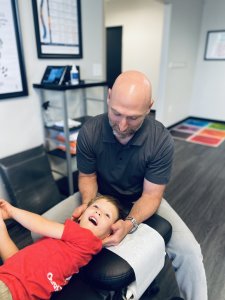Surviving Summer Celebrations When Your Child Has Sensory Overload
 Is your child already dreading summer celebrations? Are you anxious about the inevitable meltdowns, tantrums, and tears that seem to accompany every fireworks display or crowded holiday gathering?
Is your child already dreading summer celebrations? Are you anxious about the inevitable meltdowns, tantrums, and tears that seem to accompany every fireworks display or crowded holiday gathering?
If you’re like many parents we meet, you’ve probably tried everything—noise-canceling headphones, watching fireworks from a distance, or even avoiding celebrations altogether. But what if I told you that these well-meaning strategies only address the symptoms, not the actual root cause of your child’s sensory overload?
The Hidden Truth About Sensory Challenges
Studies show that up to 1 in 6 children struggle with sensory processing challenges. For these kids, events like Fourth of July celebrations aren’t just uncomfortable—they can be genuinely overwhelming and even painful.
But here’s what most physicians aren’t telling you: your child’s extreme reaction to fireworks and celebrations isn’t simply about loud noises or bright lights. It’s often a sign of a deeper neurological imbalance that can be properly addressed, not just managed through avoidance.
Logan’s Story: From Overwhelmed to Thriving
Let me tell you about Logan, a child whose story might sound familiar. For his first few years of life, Logan struggled with such severe sensory overload that his family couldn’t take him anywhere in public—not grocery shopping, not to restaurants, certainly not to loud events like fireworks displays.
His parents constantly dreaded social gatherings and worried about his future and starting school. Logan’s sensory challenges were so extreme that once, when he cut himself badly, he didn’t even register the pain—he was only bothered by the sensation of blood running down his arm.
Traditional approaches weren’t helping, and his family felt increasingly isolated and hopeless. But today, after receiving Neurologically-Focused Chiropractic Care that addressed the root cause of his sensory processing challenges, Logan is a thriving honor roll student who can enjoy family celebrations, including Fourth of July festivities.
His transformation from a child trapped by sensory overload to one who can participate fully in life’s experiences shows what’s possible when we address the real underlying cause rather than just managing the symptoms.
Understanding Your Child’s Nervous System
Sensory overload isn’t just about external triggers like loud noises and bright lights—it’s a sign that your child’s nervous system is stuck in a state of constant “fight or flight,” making normal sensory input feel threatening or overwhelming.
This state, which we call “sympathetic dominance,” means your child’s brain is constantly on high alert, unable to properly filter and process sensory information from their environment.
What makes the Fourth of July particularly challenging is that it combines multiple intense sensory experiences simultaneously—loud unexpected noises, bright flashing lights, crowds, unusual smells from sparklers and barbecues, and disrupted routines.
When your child’s nervous system is already struggling to process everyday sensory information, these holiday celebrations can become the perfect storm that pushes them over the edge into complete overload.
The Root Cause: Beyond Symptom Management
The root cause of your child’s sensory challenges is often a condition called dysautonomia—an imbalance between the “fight or flight” sympathetic nervous system and the “rest and digest” parasympathetic system.
This imbalance is frequently caused by subluxation, which is essentially interference in the communication between the brain and body, particularly affecting the vagus nerve—the master controller of the parasympathetic nervous system.
Surprisingly, this subluxation often begins during birth, especially when interventions like C-sections, forceps, vacuum extraction, or induction are involved, creating what we call “overlooked and dismissed birth trauma.”
When the vagus nerve is compromised by birth trauma, your child’s nervous system gets stuck in an overactive sympathetic state, making it nearly impossible for them to naturally calm and regulate themselves.
Why Traditional Approaches Fall Short
Traditional approaches to sensory overload focus primarily on avoidance strategies—skipping fireworks, using noise-canceling headphones, or creating “sensory-friendly” environments.
While these strategies can help in the moment, they don’t address the underlying neurological dysfunction that makes your child hypersensitive in the first place.
Medications that attempt to dampen your child’s responses often come with unwanted side effects and still don’t fix the root neurological imbalance.
Even therapy approaches like sensory integration therapy or occupational therapy, while beneficial, are often less effective if the underlying nervous system dysfunction isn’t addressed first.
A Different Approach: Addressing the Root Cause
At Elevate, our approach takes a fundamentally different path by directly addressing the root cause of your child’s sensory challenges—the subluxation and dysautonomia affecting their nervous system.
We start with comprehensive INSiGHT Scans, particularly the NeuroSpinal EMG Scan, which allows us to measure the exact location and severity of nervous system stress and tension in your child’s body.
These scans help us identify the “nociception” or neurological noise that’s disrupting your child’s ability to process sensory information properly, creating what we often call “Noisy Brain Syndrome.”
Our precise, gentle adjustments then target these areas of subluxation, helping to restore balance between the sympathetic and parasympathetic nervous systems and allowing your child’s brain to better filter and process sensory input.
Imagine a Different Summer for Your Family
Imagine your child actually looking forward to Fourth of July celebrations, get-togethers, and summer parties instead of dreading them. Picture your family enjoying fireworks together without having to leave early because of a meltdown. This isn’t just wishful thinking—it’s what we see regularly when children receive care that addresses the real root cause of their sensory challenges.
Like Logan, who transformed from a child unable to handle even simple public outings to a thriving honor roll student, your child has the potential to overcome sensory overload when the underlying nervous system dysfunction is properly addressed. The difference isn’t just noticeable during big events like the Fourth of July—it impacts every aspect of your child’s development, learning, and quality of life.
Ready to Help Your Child Thrive?
We would love to help your child’s nervous system find balance so they can experience all the joy this summer has to offer. If you’re ready to move beyond just managing symptoms and start addressing the root cause of sensory overload, call Elevate today to schedule a consultation and INSiGHT Scans.
Because your child doesn’t need to “grow out of” sensory overload—they need someone to help get to the root of it. And we’re here to help with just that.
